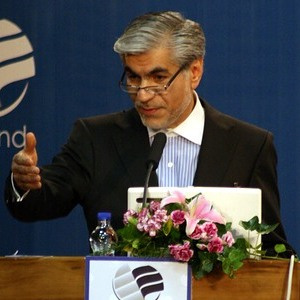The Challenges We Are Facing
Mohammad Hossein Adeli’s opening speech in Ravand Institute’s third annual conference

We are facing two types of challenges in today’s world: the present challenges and the prospective challenges which will transform the world in medium-term and long-term.
One of major events of these days is United States’ presidential election. The question is: will neo-cons’ rule come to an end? Will United States end a mission which has had heavy economic and sociopolitical costs?
Recession in U.S. is currently affecting other developed countries. There are grave concerns over high price of oil and energy security. Competition between countries to reach a higher income and vulnerability of financial markets has effected the state of welfare across the world. The BRICs (Brazil, Russia, India and China) are dominating the world, rise of new leaders and formation of new coalitions in Europe will change the circumstances and climate change has become worrisome.
The second challenge is upcoming changes across the world which shift economic centers and disturb the balance of power. Countries are seeking their future role and competition is at its pinnacle. They’re using all their capacities for this; thus, new actors are rising. All these changes require the world to change. Change of courses changes the weight of actors.
We have gathered here to discuss some economic regional and international issues that affect the future developments.
How can we provide energy security and how can we conserve energy for future use? How can we use oil and gas revenue in investments? How are Russia, Europe, China and OPEC playing the game?
How will Iraq achieve stability? What will be Lebanon’s political future? Will a new firm political-economic partnership be formed among Arab states of the Persian Gulf? Will Pakistan continue its traditional rivalry with India? Will it experience economic development or will it become a failed state run by extremists?
What about the nature of competition in Central Asia among trans-regional actors? What will happen to Shanghai Cooperation Organization? Will this unifying organization continue its activity?
To deal with changes we must identify our shared interests and choose a path that guarantees welfare and security of all actors. We believe in receiving a share of interests and achievements on a win-win basis.
Monopoly is history and doomed to fail. Cooperation is the new way of playing the game in which all actors holds a share, albeit with different ranges of influence. What one owns may not last forever. Interaction is the new rule of this game.
Financial cooperation and joint investment are manifestations of the new course in global developments and these must be in a way that provides a strategy for our future.
The goal of this gathering is to discuss all the prospective challenges. Ravand Institute’s innovative this year has been a running a panel on Iran-Arab relations. We have gathered here, on the brink of changes, to reach a new definition of shared interests, based on national and regional interests, and not outdated approaches.

